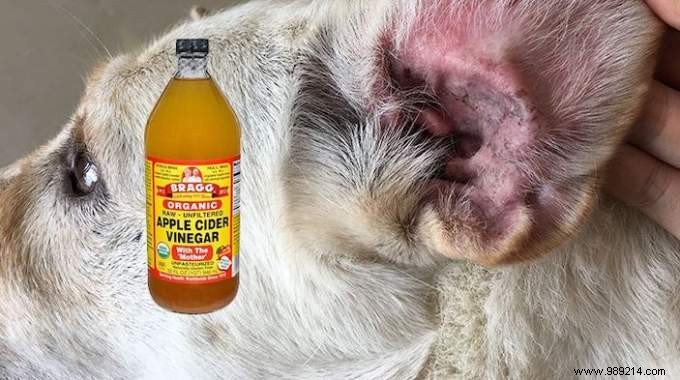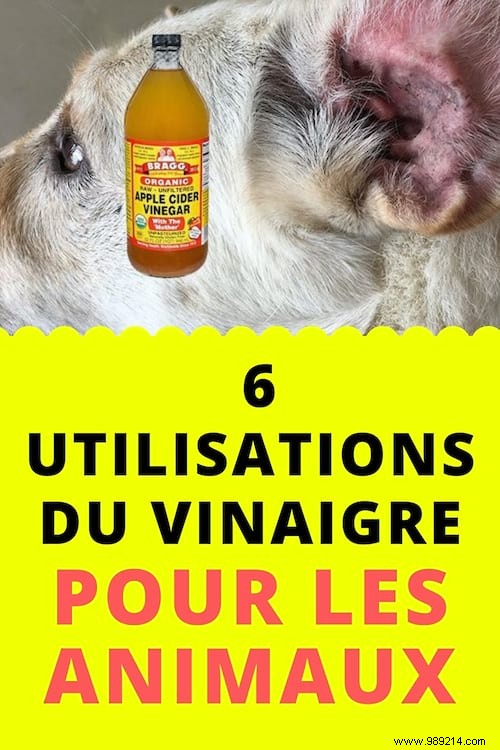
Do you have a pet at home?
A dog, a cat, a hamster, a guinea pig, a rabbit or a bird?
Then white vinegar and apple cider vinegar are the 2 liquids you must have at home.
Whether it's to clean your pets' ears, eliminate fleas, or remove pee odors, vinegar is here to help!
Here are 6 amazing uses for vinegar for animals that will make your life easier. Watch:

Is your young puppy or kitten incorrigible?
The more you tell them not to bite or scratch your furniture, the more they take pleasure in doing the opposite!
Would you like to know how to keep our friendly animals at bay?
Fill a spray bottle with white vinegar and simply sprinkle a small amount on the furniture to be protected.
Dogs and cats don't like the smell of vinegar at all! This will keep them at bay.
Easy and useful, right? Check out the trick here.
The ears of dogs and cats are very delicate.
Apple cider vinegar is there to help us take care of it since, just like for humans, this type of vinegar is very good for our health.
So to avoid the proliferation of bacteria or other harmful organisms such as dust mites, do this.
To prevent infections (to be done every week).
Dip a small cotton ball in a half warm water / half apple cider vinegar solution and gently clean the walls of your pet's ears.
In case of proven infection (to be done for 5 days for each ear).
Use the same vinegar compound as for the preventative method, but apply with a dropper.
Then massage gently and pass a small cotton ball to dry the inside of the ear.
Thanks to these 2 processes, you will limit ear infections and your little animals will no longer have itchy ears.
Be careful though:if the problems persist, consult your veterinarian. Also be careful never to apply vinegar to cuts. Check out the trick here.
Do you want to know how to fight effectively against fleas and ticks that ruin the life of your favorite animal?
So apply these 2 grandmother's methods.
Preventive method:
Prepare a 50% water / 50% vinegar compound and apply directly to your pet's hair, rubbing as if you were soaping it.
The coat must be well soaked (good luck with your cat who hates the smell of vinegar).
Curative method:
If fleas have already taken up residence in your pet's hair, increase the dose of vinegar versus water to kill them. Then rinse your pet.
After having carried out one or the other of these 2 processes, you can also make a mild anti-flea shampoo.
For this, prepare a compound with 2 tablespoons of vinegar in 1 liter of water to put in a spray bottle.
After rinsing your pet, spray the solution on the coat, being very careful not to get it on his eyes.
Then simply let it air dry. Check out the trick here.

A handy tip when you have young pets who still confuse your floors with their litter and leave...
...Behind them traces and/or unpleasant odors.
If your pet has peed on a hard floor, first pat the stain with paper towel.
Then, to remove all stains and disinfect the area, wipe down with a mop soaked in a 50% hot water / 50% vinegar mixture.
Then dry with paper towel.
Be careful, on a vinyl or wooden floor, do a test on a small area first to see if the vinegar does not leave traces.
In the event of urine on a rug or carpet, use absorbent paper to dab the stain then pour a little pure vinegar on the soiled area.
Dab again with a cloth, add a little vinegar and let dry.
Finally, if you have small rodents and want to remove traces of urine from their cage, use pure or diluted vinegar via a spray bottle.
Spray the stain, leave to act for a few moments, then rub or clean the area with a sponge soaked in vinegar.
Then rinse as desired. Check out the trick here.
Litter boxes can very quickly become a nest of bad odors and bother all the surrounding rooms.
What you need to do to properly deodorize and disinfect litter boxes is fill them halfway with warm water and add 1 glass of white vinegar.
Then let it act for 10 minutes.
Drain the water from the litter and sprinkle with baking soda then scrub with a sponge and rinse.
Finally, wipe everything down with a dry cloth or paper towels.
Do this cleaning 1 time out of 2 with bleach and you will never have bad odors again.
Little bonus tip:to make sure your companion does his business in his litter, just pour 1 drop of bleach because it attracts them! Check out the trick here.
Your birds are not left out with regard to the benefits of vinegar since it allows them to disinfect their cages, feeders and drinkers.
To do this, remove the drinker and feeder from the cage and immerse them in very hot water.
Add 1 cup of vinegar and 1 tablespoon of dish soap and rinse thoroughly.
Once a week, soak all these dirty utensils in vinegar for several hours to maintain cleanliness.
Another possibility to clean and disinfect all the other accessories of the cage (aviaries, perches) is to pass a 50% water / 50% vinegar solution.
Finally, for very dirty areas, sprinkle vinegar, leave to act for a few moments, then sprinkle the area with baking soda.
Then rub with a sponge or other accessory.
Using a toothbrush or a cloth impregnated with vinegar, remove the remains of dirt and rinse with clear water. Check out the trick here.